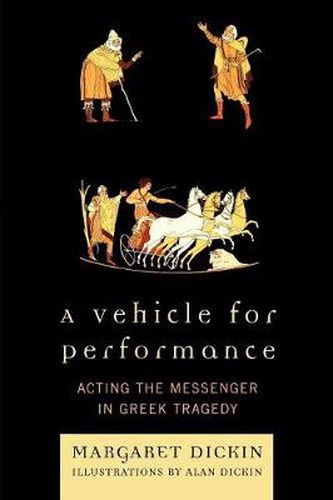Readings Newsletter
Become a Readings Member to make your shopping experience even easier.
Sign in or sign up for free!
You’re not far away from qualifying for FREE standard shipping within Australia
You’ve qualified for FREE standard shipping within Australia
The cart is loading…






Just as naturally happens with actors in tragedies where he who wears the mask of a messenger or servant gains glory and takes the lead while he who bears the crown and sceptre is not listened to when he speaks… -Plutarch This book investigates the transformation of the Tragic Messenger, traditionally a minor supporting character in Greek drama who brought news from off stage, into one of the leading acting roles in ancient drama. It examines the features of Messenger speeches which made them attractive acting roles, reviews the Tragic Messenger in vase paintings, and analyzes the distribution of acting roles in the extant fifth-century tragedies. The technique of masked actors playing multiple roles in the same drama permitted ‘metatheatrical’ linkages between these acting roles. When these linkages involved Euripides’ very vivid Messenger speeches, they allowed the Tragic Messenger to become an indispensable and stereotypical part of the drama. This was not only important in the development of the tragic genre itself, but may also have led to the stock role of the Running Slave in comedy.
$9.00 standard shipping within Australia
FREE standard shipping within Australia for orders over $100.00
Express & International shipping calculated at checkout
Just as naturally happens with actors in tragedies where he who wears the mask of a messenger or servant gains glory and takes the lead while he who bears the crown and sceptre is not listened to when he speaks… -Plutarch This book investigates the transformation of the Tragic Messenger, traditionally a minor supporting character in Greek drama who brought news from off stage, into one of the leading acting roles in ancient drama. It examines the features of Messenger speeches which made them attractive acting roles, reviews the Tragic Messenger in vase paintings, and analyzes the distribution of acting roles in the extant fifth-century tragedies. The technique of masked actors playing multiple roles in the same drama permitted ‘metatheatrical’ linkages between these acting roles. When these linkages involved Euripides’ very vivid Messenger speeches, they allowed the Tragic Messenger to become an indispensable and stereotypical part of the drama. This was not only important in the development of the tragic genre itself, but may also have led to the stock role of the Running Slave in comedy.